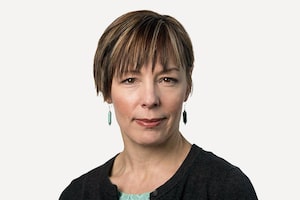
People are framed by the flowers as they walk through Whistler, B.C., on May 15, 2020.JONATHAN HAYWARD/The Canadian Press
Operators in B.C.'s hard-hit tourism sector who have waited months for government aid now say many won’t qualify for the grants that were supposed to help them survive the pandemic.
Last March, all parties of the provincial legislature approved funding for an economic recovery package, but the details of the $2-billion plan were not announced until Sept. 17 – four days before NDP Leader John Horgan called a snap election.
The package includes a $300-million grant program for small and medium-sized businesses. The criteria for applying were posted on Oct. 9, halfway through the election campaign. On Wednesday, the Ministry of Finance had received 150 grant applications, but officials could not say how long it would take to get approvals.
“It’s a fairly extensive and onerous application process,” Walt Judas, chief executive officer of the Tourism Association of B.C., said in an interview on Wednesday.
The tourism and hospitality sectors – which include many small and medium-sized businesses – were identified early on as the most vulnerable to the economic impact of the pandemic, as health measures restricted operations, and border closings cut off international travel.
However, applicants must charge provincial sales tax to qualify, and that leaves out many tourist attractions, experiences and services. The program states that funds aren’t meant to be used for fixed costs, such as mortgages and leases for vehicles, which are a primary concern for tourism operators. And businesses that are less than three years old aren’t eligible.
BC Liberals plan would put $9-billion dent in provincial budget in first year
B.C. NDP promises free prescription contraception if elected
Mr. Judas said he hopes the provincial government is willing to amend the grant program so more businesses will qualify.
“We’re still able to provide some feedback to government on some of the criteria, to ensure that they understand where the gaps are, and can make adjustments as necessary.”
Businesses that can’t apply include the Josie Hotel, a 106-room boutique hotel that opened on the foothills of the RED Mountain ski resort in the Kootenays two years ago.
The hotel had 100 staff in its first year of operation and plans to expand, making it a large employer in the town of Rossland, with a population of 3,000. It closed in March with the arrival of the pandemic lockdowns, although the restaurant re-opened for the summer. General manager Jesse Crockett said the business has taken a huge hit as a result of the pandemic, but it hasn’t been able to secure any provincial funds.
“We are going to open this winter,” he said, and it will be a make-or-break season. “It could be busy or it could be slow,” he said. The lack of cashflow means “significant challenges for us, weighing on the future for our operations.”
Mr. Crockett said he had been very hopeful that the grant program would provide some relief. But when he read the criteria, he saw that the hotel would not qualify.
"One of the things I’ve been asking within our industry is: ‘What are we doing wrong, why can’t we get help?’ No one can find a way to get help. It’s not just me, it’s everyone in tourism.”
The grant program is one of three main programs in the economic recovery package that was promised to help businesses and protect jobs. A $50-million fund for tourism won’t be distributed until a task force makes recommendations at the end of the year. Applications for the $90-million Community Economic Recovery Infrastructure Program will close after election day, and it will be up to the new minister to approve grants.
When the economic recovery program was announced, Finance Minister Carole James acknowledged the urgency. “It means a small tourist operator hard hit by record-low tourism this year will get help paying the bills now,” she said on Sept. 17.
Despite assurances that the election campaign would not interrupt the delivery of those programs, government officials cannot provide confirmation that any of the promised financial support has been delivered to struggling businesses.
Mr. Horgan said during the televised leaders debate on Tuesday night that he made sure the pandemic recovery money “started to go out the door” before he called the election.
The NDP Leader was responding to questions from Andrew Wilkinson, the BC Liberal Leader, who raised concerns that business failures are increasing while the government relief has yet to flow. “Why would you block that package?" he asked.
Mr. Horgan said his government needed time to design the aid plans. “The programs for small businesses have criteria, they are in place, the grant applications are in play," he said during the debate. "Public servants, not politicians, will make the decisions, and those dollars will flow as quickly as possible.”
We have a weekly Western Canada newsletter written by our B.C. and Alberta bureau chiefs, providing a comprehensive package of the news you need to know about the region and its place in the issues facing Canada. Sign up today.
 Justine Hunter
Justine Hunter